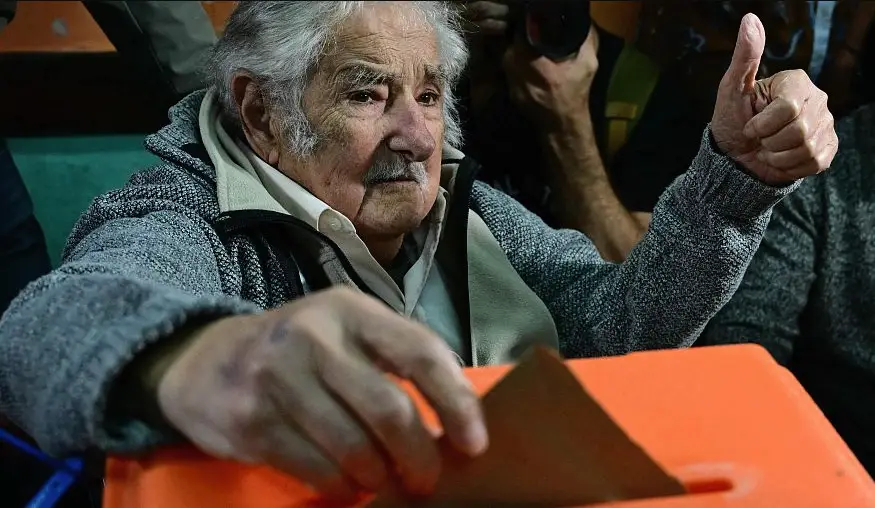Uruguay is a sui generis case of its kind—a country born out of the intervention of a foreign power, destined to be a buffer state between two giants who, in its early years, constantly vied to take control of its scarce territory. And despite so many assaults, Uruguay has managed to endure thanks to the heroic efforts of a political class that has (re)built a solid democracy. In its nearly 200 years of history, the legacy of several leaders persists, but none has had the international impact of José Mujica.
The passing of José “Pepe” Mujica leaves the Uruguayan left orphaned. The inevitable course of human existence has taken with it the last great figure of the Broad Front. A departure that saddens an entire nation, though it surprised no one. Mujica had announced in April 2024 that he was suffering from an esophageal tumor—a diagnosis which, together with his advanced age, led to his rapid decline in a matter of months. Although his body failed him, his mind remained as lucid and strategic as ever. During that time, he quietly mapped out his final move—one that resulted in the Broad Front’s return to presidential power. And in a Latin America where far-right liberalisms are on the rise, the final contributions of those figures who once fueled the celebrated progressive era become especially significant.
How is it possible that a former guerrilla became a global icon? By way of redemption. Mujica never denied his past as a member of the armed Tupamaros movement; on the contrary, he acknowledged that the people had every right to judge and even condemn him for it. Yet suffering under the hardships of a dictatorship transformed him into a staunch democrat—an image far stronger than his earlier actions. His methods may be criticized, but no one can deny that his fight was against authoritarianism, not the will of the people. The Uruguayan public understood this, and while many never forgave him, neither did they turn a blind eye. Once free and back in a democracy, Mujica was destined to become a significant figure.
The Mujica phenomenon—at times inexplicable—is also the result of a left that managed to establish itself over time. Uruguay joined the region’s progressive turn somewhat late. In a country traditionally governed by center-right forces, the sweeping victory of Tabaré Vázquez in 2004 was a major test for the Broad Front. For many, the coalition’s rise was the outcome of fatigue from previous administrations, worn down by economic crisis and lacking the energy to rebuild the country. Thus, a new project was born—an experiment filled with hope that, in the following years, proved successful and doubled down, winning again with its most unconventional candidate: “Pepe.”
Unlike Vázquez, a technocratic-style socialist, Mujica was, at his core, a political animal. He lacked formal education, but didn’t need it. During his imprisonment under the last dictatorship (1973–1985), this rough-edged man spent nearly seven years without reading a book, and in his own words, avoided “falling into madness” by befriending his own mind. Thinking allowed him to forge a unique vision—not just of politics, but of life as a philosophy.
He was famed for his altruism, earning the title of “the world’s humblest head of state,” but his personal simplicity did not translate into apathetic governance. His administration focused on building a true welfare state, pushing through reforms such as the legalization of abortion, same-sex marriage, and marijuana. On the international stage, he turned Uruguay into a human rights ally: recognizing the sovereignty of Palestine, welcoming Syrian refugees, and even taking in detainees from Guantánamo Bay. Nearly three governments later—including one from the opposite political camp—none of his social policies have been rolled back.
Mujica silenced critics through political action, yes—but above all through a stance grounded in opposition to hatred. In his final years, the former president combined messages of tolerance with resilience, never losing his distinctive tone. He was a reference point for those who shared his ideology, an adversary to his opponents—but never an enemy, not even to his former repressors. He received visits from all walks of life—from friends like Brazilian President Luiz Inácio Lula da Silva, to icons like acclaimed actress Glenn Close, to controversial figures such as Spain’s former king, Juan Carlos I, whom Mujica had sit in a rustic chair made from plastic bottle caps. And while that “humbled” the monarch’s lavish lifestyle, he didn’t so much as flinch.
Each and every one of them had something to discuss with Mujica, because he knew exactly which chord to strike to enrich the conversation. His fame grew to such heights that he even dabbled in being a “film star,” with two premieres at the 2018 Venice Film Festival: El Pepe: A Supreme Life, a documentary by Serbian director Emir Kusturica, and A Twelve-Year Night by Uruguayan filmmaker Álvaro Brechner, a portrayal of Mujica’s years in prison alongside Mauricio Rosencof and Eleuterio Fernández Huidobro. There may be no other living global leader who inspired such myth around himself.
The physical disappearance of José “Pepe” Mujica saddens Uruguay, but it also marks a great loss for Latin America as a whole. The continent is left without charismatic leadership, while politicians are forced to confront a world marked by overlapping crises. And as voices rise that threaten the survival of democracy, the challenge is to keep alive the legacy of those who learned that intolerance is never the answer. “Pepe” left behind a great deal of unfinished work for the generations to come.
*Machine translation proofread by Janaína da Silva.













